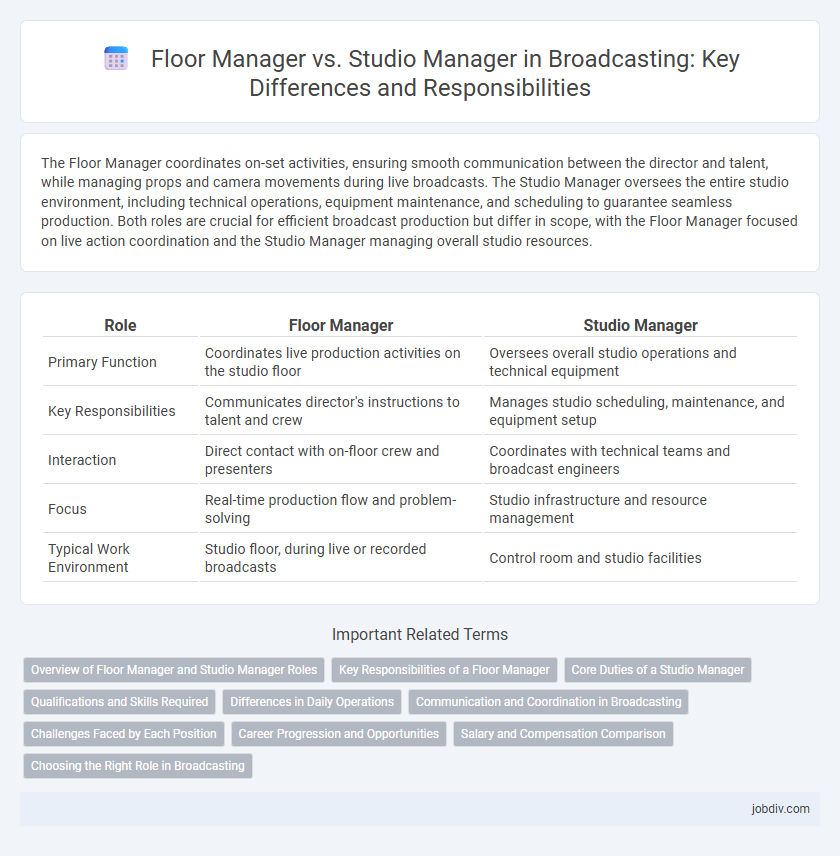The Floor Manager coordinates on-set activities, ensuring smooth communication between the director and talent, while managing props and camera movements during live broadcasts. The Studio Manager oversees the entire studio environment, including technical operations, equipment maintenance, and scheduling to guarantee seamless production. Both roles are crucial for efficient broadcast production but differ in scope, with the Floor Manager focused on live action coordination and the Studio Manager managing overall studio resources.
Table of Comparison
| Role | Floor Manager | Studio Manager |
|---|---|---|
| Primary Function | Coordinates live production activities on the studio floor | Oversees overall studio operations and technical equipment |
| Key Responsibilities | Communicates director's instructions to talent and crew | Manages studio scheduling, maintenance, and equipment setup |
| Interaction | Direct contact with on-floor crew and presenters | Coordinates with technical teams and broadcast engineers |
| Focus | Real-time production flow and problem-solving | Studio infrastructure and resource management |
| Typical Work Environment | Studio floor, during live or recorded broadcasts | Control room and studio facilities |
Overview of Floor Manager and Studio Manager Roles
Floor Managers coordinate on-set activities, ensuring smooth communication between the director, crew, and talent while managing timing and stage logistics. Studio Managers oversee the entire studio operations, including technical equipment maintenance, scheduling, and compliance with broadcasting regulations. Both roles are critical for seamless production but differ in scope, with Floor Managers focused on live action control and Studio Managers handling the broader studio environment.
Key Responsibilities of a Floor Manager
A Floor Manager coordinates on-set activities, ensuring smooth communication between the director, crew, and talent during live broadcasts or recordings. They manage the timing of segments, oversee camera placements, and maintain order to prevent disruptions on the studio floor. Their key responsibilities include cueing presenters, handling audience interactions, and ensuring compliance with safety protocols under fast-paced production conditions.
Core Duties of a Studio Manager
A Studio Manager oversees the entire broadcast environment, ensuring seamless coordination between technical teams, on-air talent, and production staff to maintain high-quality output. Core duties include managing studio schedules, supervising equipment maintenance, and enforcing broadcast standards and compliance regulations. Their role is critical in troubleshooting live broadcast issues and implementing workflow improvements to optimize studio operations.
Qualifications and Skills Required
A Floor Manager requires strong communication skills, quick decision-making abilities, and expertise in coordinating live studio activities, ensuring smooth camera cues and talent management on set. Studio Managers need advanced technical knowledge of broadcasting equipment, comprehensive understanding of production workflows, plus leadership skills to oversee the entire studio operation and manage technical staff. Both roles demand problem-solving capabilities and the ability to work under pressure, but Studio Managers typically require more formal education in broadcast technology or media production.
Differences in Daily Operations
A Floor Manager oversees live studio activities, coordinating camera cues, talent movements, and stage logistics to ensure smooth on-air production. A Studio Manager handles technical equipment maintenance, signal flow, and coordination with engineering teams to guarantee broadcast quality and compliance with technical standards. While the Floor Manager focuses on real-time operational execution, the Studio Manager manages the infrastructure and technical environment supporting the broadcast.
Communication and Coordination in Broadcasting
Floor Managers ensure seamless real-time communication between the director and on-set talent, managing cues and timing to maintain production flow. Studio Managers oversee broader coordination, including technical setup, crew management, and liaising with multiple departments to align all broadcasting elements. Effective communication and precise coordination by both roles are critical to delivering a smooth and professional broadcast production.
Challenges Faced by Each Position
Floor Managers navigate real-time coordination challenges, ensuring seamless communication between on-set talent and technical crews under strict time constraints. Studio Managers face complex operational challenges, including managing multiple production workflows, overseeing technical equipment maintenance, and adhering to tight broadcast schedules. Both roles demand quick decision-making and problem-solving to maintain broadcast quality and minimize disruptions.
Career Progression and Opportunities
Floor Managers typically begin their broadcasting careers coordinating live production elements and may advance to Studio Manager roles overseeing entire studio operations, including technical teams and scheduling. Career progression from Floor Manager to Studio Manager offers expanded responsibilities, higher decision-making authority, and increased involvement in strategic planning within television production environments. Opportunities for growth in these roles often depend on experience with live broadcasts, technical expertise, and leadership skills essential for managing complex studio workflows.
Salary and Compensation Comparison
Floor Managers in broadcasting typically earn a median salary ranging from $45,000 to $60,000 annually, reflecting their hands-on coordination of on-set activities and real-time problem-solving skills. Studio Managers, overseeing broader technical operations and ensuring smooth broadcast quality, command higher compensation, with average salaries between $60,000 and $80,000 per year. Variations in salary depend on factors such as experience, location, and the size of the broadcasting organization.
Choosing the Right Role in Broadcasting
Choosing the right broadcasting role hinges on understanding the distinct responsibilities of a Floor Manager and a Studio Manager. A Floor Manager coordinates on-set activities, ensuring smooth communication between the director and talent, while a Studio Manager oversees technical operations and equipment management in the control room. Selecting between these roles depends on whether you excel in live coordination and interpersonal skills or technical broadcasting systems and equipment oversight.
Floor Manager vs Studio Manager Infographic

 jobdiv.com
jobdiv.com